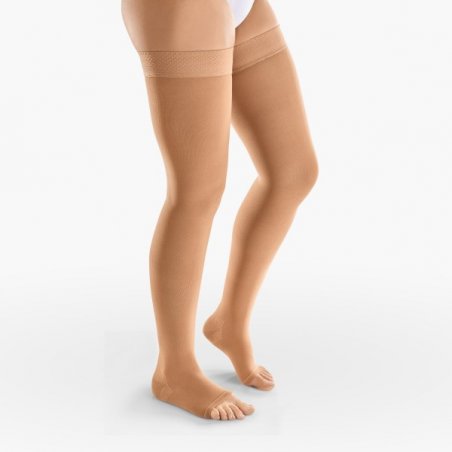

These high-quality Venosan thigh-high 2 grade compression stockings contain 70 percent nylon and 30 percent elastane. Socks are open-toed and are suitable for primary and secondary venous varicose veins, sclerotherapy, post-venous surgery, deep vein thrombosis, grade 1 to 3 chronic venous insufficiency, edema during pregnancy, or stasis after prolonged immobility. The function of these socks is to activate blood circulation in the legs (to compress the vein, narrow its cross-section and prevent blood accumulation in the lower extremity). Research have shown that compression stockings reduce leg swelling and fatigue and prevent the progression of chronic venous insufficiency. The set includes a special sock, which makes easier to put on compression socks.
VENOSAN 6000 II compression class (Ccl.2) socks comply with the medical product standard RAL (RAL-GZ-378). It is the strictest European standard for medical compression products.
Putting on compression stockings requires more hand strength
| Size | S | M | L | XL |
| Ankle (narrowest point above ankle bone) |
20-22 | 23-25 | 26-28 | 29-31 |
| Narrowest point approx. 2–3 cm below the knee |
29-38 | 32-40 | 35-43 | 38-46 |
| Thigh (5 cm below groin) | 49-63 | 54-66 | 58-70 | 63-74 |
|
Sock lenght |
Leg lenght ( cm) |
|
Short |
59-67 |
|
Long |
68-78 |

How to wear compression socks?
Put on compression socks in the morning to prevent swelling of the feet or until the swelling is mild and stay with them all day when walking or sitting for a long time. Put off compression socks in the evening and allow the feet to rest. Make sure you wear compression socks when traveling with airplane or car. This will protect your feet from swelling, fatigue and ensure an efficient return of blood from your feet to your heart. It is also important to move your feet when sitting, standing or traveling for long periods. It is advisable to do a little leg lift, rotate the foot in a circle around the ankle joint, and if possible, walk every couple hours.
Keep your feet healthy
To keep your feet healthy, it is recommended that you maintain your physical activity level, for example walk, swim as often as possible, wear comfortable shoes, put a pillow under your feet slightly higher than your head while sleeping and wash your feet under lukewarm water daily, massage feet with light circular movements.
Care of compression socks
Washing instructions:
• You can wash socks by hands or in a washing machine by setting up a gentle washing program and putting socks in the washing bag. Water temperature - not more than 40 ° C;
• Use neutral soap for soft fabrics (do not use bleach or fabric softeners);
• Do not use any chemicals;
• Do not iron;
• Do not dry on radiators, in direct sunlight or in a dryer;
• Compression socks are best to dry in a horizontal position, allow to dry naturally in room temperature;
• Regularly wipe the silicone straps, whitch can be found on the top of the socks, with spirit to improve adhesion.
• Protect compression socks from various lubricants, creams or oils, direct sunlight, high intensity light and heat, as all of these factors affect compression reduction.